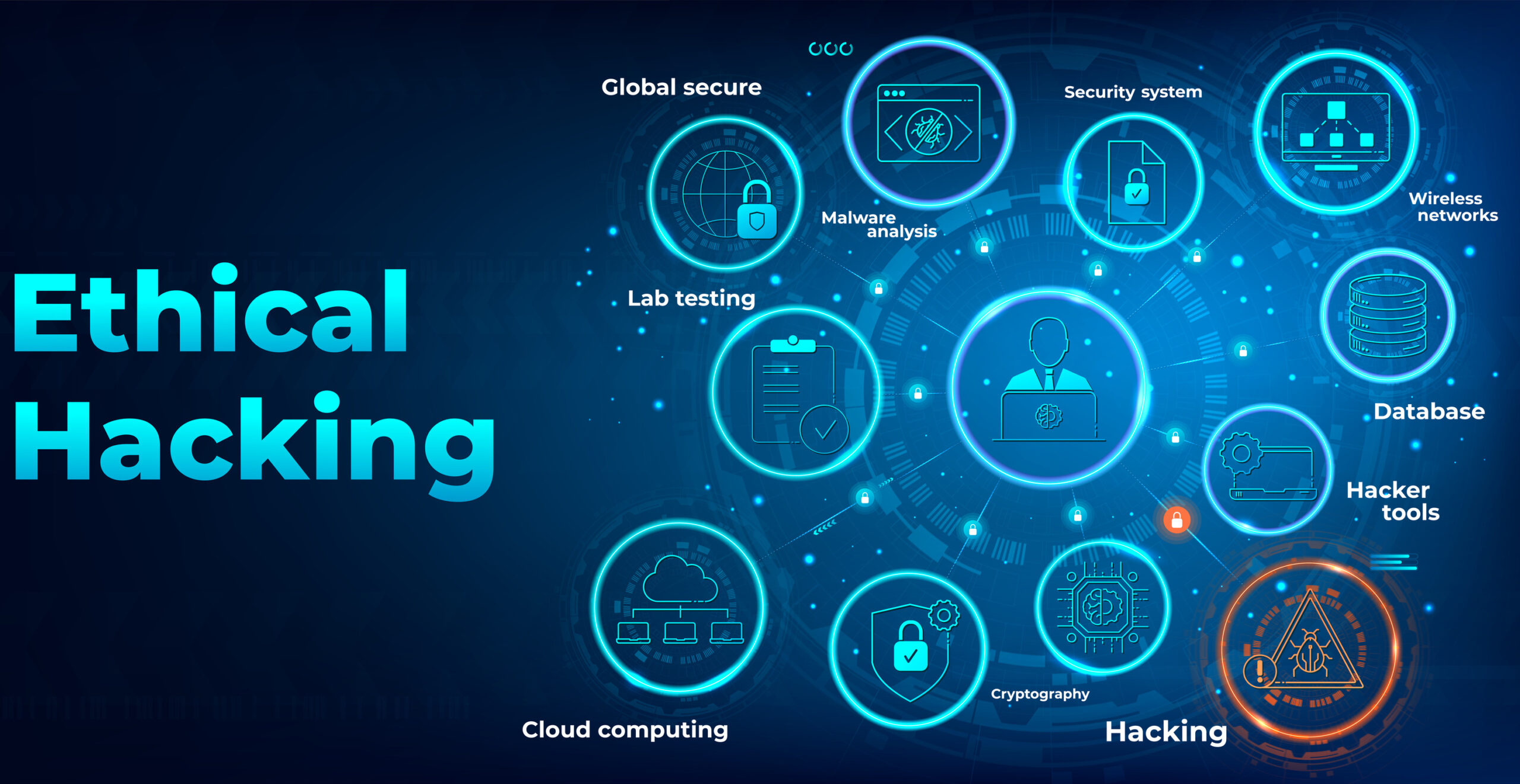Ethical hacking, also known as white hat hacking, involves the deliberate attempt to identify vulnerabilities and weaknesses in computer systems, networks, applications, and other digital assets. Ethical hackers, often referred to as white hat hackers, are individuals or professionals who are authorised to emulate the actions of malicious hackers. Their primary goal is to uncover security flaws before they can be exploited by cyber criminals.
Is Ethical Hacking Legal?
Yes, ethical hacking is legal when it is conducted within the boundaries of the law and with proper authorisation. Ethical hacking involves intentionally probing and testing computer systems, networks, applications, and other digital assets to identify vulnerabilities and weaknesses. The key factor that distinguishes ethical hacking from malicious hacking is the presence of explicit permission from the owner or responsible party of the system being tested.
Ethical hackers (white hat hackers) follow strict guidelines to ensure that their activities are legal and responsible:
- Authorisation: Ethical hackers must have written permission from the organisation or individual who owns or controls the system to be tested. Without proper authorisation, hacking activities are considered illegal.
- Scope: The testing activities are conducted within the defined scope, which outlines what systems, networks, or applications can be tested and to what extent. Deviating from the scope can lead to legal issues.
- No Malicious Intent: Ethical hackers do not engage in any activities that could cause harm, data loss, or system disruption. Their goal is to identify vulnerabilities without exploiting them for personal gain.
- Responsible Disclosure: If vulnerabilities are discovered, ethical hackers report their findings to the organisation or individual who authorised the testing. This allows the vulnerabilities to be fixed before they are potentially exploited by malicious actors.
- Professionalism: Ethical hackers maintain a professional and responsible approach throughout the testing process, adhering to ethical guidelines and best practices.
- Legal Considerations: Ethical hackers must also adhere to local, national, and international laws related to cyber security and hacking. Violating these laws can result in legal consequences.
- Privacy: Ethical hackers respect user privacy and only access information that is relevant to the testing process. Personal and sensitive data should not be exposed or accessed.
What Kind of Vulnerabilities and Weaknesses Can Be Identified During Ethical Hacking?
During ethical hacking, a wide range of vulnerabilities and weaknesses across various aspects of digital systems can be identified. These vulnerabilities can potentially be exploited by malicious actors, making it crucial to address them to enhance overall cyber security. Some of the vulnerabilities and weaknesses that ethical hackers commonly uncover include:
- Software Bugs and Flaws: Ethical hackers often discover coding errors, logic flaws, and software vulnerabilities that could be exploited to gain unauthorised access or control over applications and systems.
- Weak Authentication and Authorisation: Ethical hackers identify instances of weak passwords, improper authentication mechanisms, and inadequate authorisation controls that could allow unauthorised users to access sensitive data or systems.
- Unpatched Software: Exploitable vulnerabilities in software that haven’t been updated with the latest patches or security updates can be identified. These vulnerabilities could be leveraged by attackers to compromise systems.
- Misconfigured Systems: Ethical hackers spot misconfigured servers, network devices, and applications that could lead to unauthorised access or data leaks.
- Network Vulnerabilities: Weaknesses in network configurations, open ports, and insecure protocols can be discovered, which might enable unauthorised network access or eavesdropping.
- Injection Attacks: Ethical hackers identify vulnerabilities that could lead to injection attacks, such as SQL injection or Cross-Site Scripting (XSS), where malicious code can be injected into web applications.
- Security Misconfigurations: Improperly configured security settings, permissions, and access controls can be pinpointed, helping organisations tighten their security measures.
- Sensitive Data Exposure: Ethical hackers uncover instances where sensitive information, such as personal data or credentials, is not properly protected, leaving it vulnerable to theft.
- Default Credentials: Systems and devices with default usernames and passwords can be identified, which pose a significant security risk if not changed.
- Lack of Encryption: Ethical hackers may find cases where data is transmitted or stored without encryption, leaving it susceptible to interception and unauthorised access.
- Outdated Software: Identifying outdated software and libraries helps prevent exploitation of known vulnerabilities that have been patched in newer versions.
- Social Engineering Vulnerabilities: Ethical hackers might conduct social engineering tests to determine if employees can be manipulated into revealing sensitive information or performing unauthorised actions.
- Inadequate Logging and Monitoring: Ethical hackers may find gaps in logging and monitoring practices that could prevent timely detection of security incidents.
- Zero-Day Vulnerabilities: In rare cases, ethical hackers might discover previously unknown vulnerabilities, known as zero-days, which have not been patched by software vendors.
Who Can Be an Ethical Hacker and How?
Ethical hackers should be naturally curious about how systems work and motivated to find and solve security challenges. Becoming an ethical hacker requires dedication, continuous learning, and a passion for cyber security. With the right skills and mindset, individuals can contribute to making the digital world safer for everyone.

Anyone with a strong understanding of computer systems, networking, and programming, as well as a dedication to ethical behaviour, can potentially become an ethical hacker. Some common traits and qualifications of ethical hackers include:
1. Technical Skills and Knowledge
Ethical hackers need a solid foundation in various areas of information technology and cybersecurity. This includes understanding networking protocols, operating systems, programming languages, web technologies, and security concepts.
2. Education and Training
While formal education is not always required, having a degree in computer science, information technology, or a related field can provide a strong academic foundation. Many ethical hackers also acquire certifications to validate their skills and knowledge. Some popular certifications include:
- EC Council: Certified Ethical Hacker (CEH) Certification
- CompTIA Security+
- Certified Information Systems Security Professional (CISSP)
- Offensive Security Certified Professional (OSCP)
- Cisco Certified Network Associate (CCNA)
3. Practical Experience
Hands-on experience is crucial for becoming proficient in ethical hacking. This can be gained through personal projects, internships, or entry-level positions in IT or cyber security roles.
4. Continuous Learning
The field of cyber security is constantly evolving, so staying up-to-date with the latest threats, vulnerabilities, and security practices is essential. Engaging in online courses, workshops, conferences, and reading cybersecurity blogs is recommended.
5. Ethical Mindset
Ethical hackers must have a strong sense of ethics and responsibility. They should always operate within the confines of the law, obtain proper authorization for testing, and prioritize the security and privacy of the systems they assess.
6. Specialisation
Ethical hacking is a diverse field with various specializations, including web application security, network security, mobile app security, and more. Aspiring ethical hackers can choose to focus on specific areas based on their interests and strengths.
7. Building a Portfolio
Creating a portfolio showcasing practical projects, bug bounty achievements, or successful penetration testing engagements can help individuals demonstrate their skills and attract potential employers.
8. Professional Networking
Connecting with other professionals in the cybersecurity community can provide opportunities for learning, collaboration, and potential job openings.
9. Legal and Ethical Knowledge
Understanding laws related to hacking, cybersecurity regulations, and ethical guidelines is essential for staying on the right side of the law and practicing responsible hacking.
Is There Any Difference Between Ethical Hacking and Penetration Testing?
Ethical hacking and penetration testing are closely related terms that often refer to similar practices, but can have subtle differences in their scope and approach. Both involve simulating cyber attacks to identify vulnerabilities in a system or network, but the terms are sometimes used differently based on context and the specific goals of the assessment. Here’s a breakdown of the differences:
1. Scope and Goals:
- Penetration Testing: Penetration testing typically refers to a more structured and systematic assessment with a specific focus on finding and exploiting vulnerabilities to assess the potential impact of a successful attack. The primary goal is to identify and report vulnerabilities while providing a clear understanding of their potential impact on the system’s security.
- Ethical Hacking: Ethical hacking is a broader term that encompasses various activities aimed at identifying vulnerabilities, improving security, and assessing an organisation’s overall security posture. It may include penetration testing but can also involve other practices like vulnerability assessment, security audits, and risk assessments. Ethical hacking often has a more proactive and comprehensive approach to enhancing security.
2. Approach:
- Penetration Testing: Penetration testing often involves predefined testing scenarios that attempt to exploit known vulnerabilities in specific areas of the system. The testing is usually targeted and follows a specific methodology.
- Ethical Hacking: Ethical hacking can involve a wider range of techniques and approaches, including penetration testing, vulnerability scanning, social engineering, and more. It takes a holistic view of security and aims to identify vulnerabilities across various attack vectors.
3. Depth of Testing:
- Penetration Testing: Penetration testing may focus more on simulating specific attack scenarios to evaluate the effectiveness of security controls and identify potential entry points for attackers.
- Ethical Hacking: Ethical hacking can include a broader assessment of an organisation’s security, going beyond penetration testing to address other security concerns like policy compliance, risk management, and overall security awareness.
4. Reporting:
- Penetration Testing: Penetration testing reports typically detail the specific vulnerabilities exploited, the impact of successful attacks, and recommendations for mitigation.
- Ethical Hacking: Ethical hacking reports might encompass a wider range of findings, including vulnerabilities, best practices, security gaps, and recommendations for improving the overall security posture.
In practice, the terms “ethical hacking” and “penetration testing” are sometimes used interchangeably, and the distinction between them can vary from one organisation to another. What’s important is that both practices involve the systematic assessment of security vulnerabilities with the goal of improving an organisation’s security defences. Regardless of the terminology used, the ultimate aim is to identify weaknesses before malicious attackers can exploit them.
At Labyrinth Cyber, we’re your trusted partners in securing your digital assets. Our comprehensive penetration testing services go beyond the surface to uncover vulnerabilities that could put your business at risk. Our expert team emulates real-world cyber threats, helping you identify weak points in your systems before malicious actors do. With our services, you can strengthen your defences, maintain customer trust, and ensure compliance with cyber security regulations.



